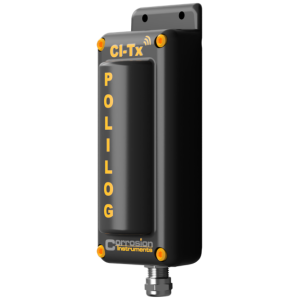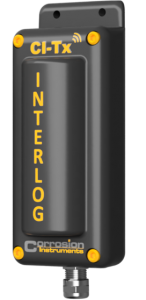

Test Point Monitoring
A closed loop automatic CP control system starts with robust polarisation monitoring. We have developed two types of polarisation monitor: the Polilog and the Interlog.


Polilog stands for POLarisation and Interference LOGger. Designed specifically for continual monitoring and surveying at CP test points, it will eliminate the need for manual surveys. Our proprietary Infrequent Interrupt Routine will enable you to measure precision Instant-Off potentials every day. Polilog will also automate Stray Current Surveys, Depolarisation Surveys and Instant-Off Surveys.


Interlog stands for INTERrupt-and-LOG. Utilising an internal 2A relay, Interlog can interrupt a sacrificial anode or a coupon in order to extend the capabilities of the Polilog to sacrificial systems.
Polilog and Interlog will change the way CP is monitored forever
- First class polarisation measurement
- Global connectivity - works anywhere
- Long-term autonomous protection - superior battery life
- Automated surveys
Polarisation Measurement
Polarisation is measured using an industry-leading 200MΩ sensing circuit and 16-bit ADC, enabling long-term use of permanent copper reference cells.
GPS time synchronisation is utilised to give you millisecond timing accuracy, allowing you to take precision Instant-Off measurements.
Other Measurements
In addition to Polarisation measurements, all Polilogs measure AC Voltage and Temperature.
Polilogs can be used to monitor drainage bonds, Insulation Joints and corrosion Coupons.
Features
- Continual monitoring of Instant off potentials, on potentials and AC voltage
- Fully automated Instant off, Stray current and depolarisation surveys
- Superior battery life
- IP 67 enclosures
- Fits in almost all test points
- Built in relay for interrupting sacrificial anodes or coupons
- Monitor Drainage bonds, polarisation cells and coupons
- Integrated surge diversion
- Precision GPS time synchronisation
- Reports location, temperature, battery capacity and a myriad of self diagnosic data
Global Connectivity
We utilise two very different communication technologies to ensure secure and reliable connectivity from any testpoint.
The Myriota Satellite network is perfect for low power, low cost monitoring of CP in remote locations.
LoRaWAN is perfect for monitoring CP in built-up and hard to reach places like under roads and footpaths.




Works anywhere?
Just about! All units are IP67 rated, UV-stabilised and have a working temperature of –20°C to 70°C. The enclosures are so small that they can fit inside a 62mm tube. We have worked closely with our early adopters to ensure that our devices can be installed almost anywhere.
Superior Battery Life
5-15 years! That’s how long you should expect the battery to last, depending on the type of installation and the frequency of measurements.
